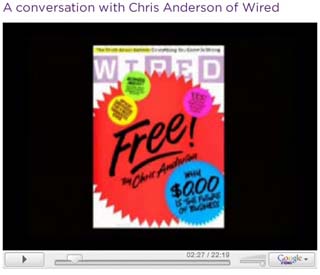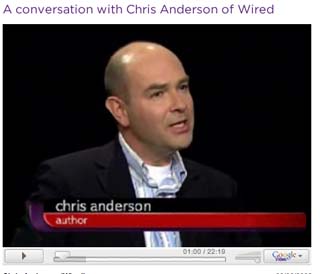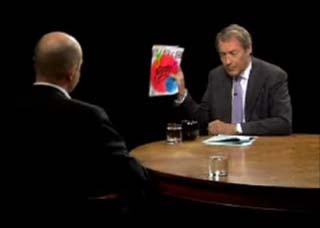
Chris Anderson of Wired Magazine: on Charlie Rose (PBS)
https://www.youtube.com/watch?v=R9wuTit9OJY

I like Charlie’s opening presentment: “I believe that there is a place in the spectrum of television for really good conversation, if it is informed, spirited, soulful.”
Spirit and soul. I like that. What’s the point, otherwise? Work isn’t anything but tasking, if there isn’t soul, isn’t spirit.
The work that we do lives in the space of soul full spirit. That means that working with people is about finding the heart of them, the heat that drives them, and brings them to a new propositions of creating community. I relate to you because I’m part of your community. I have a relationship with you because of just that — relation. Pardon the etymological link, but you know that I always go there: the latest 1390, from Anglo-Fr. relacioun, O.Fr. relacion (14c.), from L. relationem (nom. relatio) “a bringing back, restoring,” from relatus. Relate. To relate is to bring back.
That’s what Charlie’s doing, in the practice of his observations — bringing back, a restoration of connection — one person to another. One person to millions of others. That’s where we live — what do we bring back, what restorative link might there be?
It’s all about free, the interview. Freeium — the premium of free. “You can invert the free modeling — 99% of people can access something for free, 1% will pay. The web takes the modeling for media that emerges in sharing offerings for part of the end of the long tail of niche relationship development. Gift economy is about opening relationships with freedom — and literally free, or nearly so — in low pricing as a way of connecting with people. Radiohead’s recent modeling — to Charlie’s query — is about developing the opening relationships for getting people connected to their music (free) and their potential offering of live (personally connected) links to their performance. Which, as Chris intones, is where the real money is made. He references, as well, the triad of economic presence: the money economy, that’s something that we are all familiar with. We do something or get something and we pay for it. There are added substrates. For two — there’s the attention economy. It’s time and our attention — we have very limited time; access to that is special for external relationships. And the reputation economy — ebay rankings, links to , Attention is about offering a link to the attention to the story. Are you connected? Does the story access your attention? Then, how do you prioritize levels of attention — reputation works there. They’re surely aligned, in the thinking of Rose’s observations, as well as Chris’ foundation of “Free!”

The story isn’t necessarily new, per se, to Anderson’s reflections — King Gillette opened his razor blade connections to customer communities with the offering of free product. The connection leads to more connections — and buying communities, with relationships, flourish and expand.
So, what’s the deal with magazines — and the modeling of the new media? They have a place, according to Chris, that’s about getting to the space, in the reader’s hands, that can’t be experienced on the web, on a screen. Same with books — they have a place that can’t be duplicated on the web experience.
Charlie: What will the web do to televised content, high cost with expensive visual values? For Chris — pardon my paraphrasing — it’s about finding the story that’s relevant to the viewer. YouTube is all about funky transposition of story that is, precisely — one size fits one — just for the viewer. There are millions of video stories, but there’s plenty there that’s relevant to you — the viewer.
What more? Relationships? Creating levels of granularity — offering ways of distributing, free or otherwise — ways to precisely link up with the complexly split layering of human connectivity in marketing distribution of any sort: the long tail — furthered in the story of free.
And, yes. We designed the cover. With Scott Dadich, Creative Director, Wired.